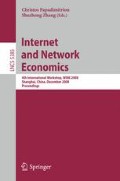Abstract
This paper presents an evolutionary bargaining model between two groups of buyers and sellers. One buyer and one seller are randomly matched to play the Nash demand game: they choose a best reply based on information about past bargains coming from other members of their group. Information arrival is modeled as a Poisson process, and the rates of these processes form a weighted communication network. Over the long run, the stochastically stable division is the asymmetric Nash bargaining solution (ANB) with weights determined by the structure of the communication network in each group. The optimal networks for a group are (quasi)-regular networks without weak links.
Access this chapter
Tax calculation will be finalised at checkout
Purchases are for personal use only
Preview
Unable to display preview. Download preview PDF.
References
Gallo, E.: Bargaining and Social Structure. Mimeo (2008)
Nash, J.F.: The Bargaining Problem. Econometrica 18(2), 155–162 (1950)
Rubinstein, A.: Perfect Equilibrium in a Bargaining Model. Econometrica 50(1), 97–109 (1982)
Young, P.H.: An Evolutionary Model of Bargaining. Journal of Economic Theory 59(1), 145–168 (1993)
Calvó-Armengol, A.: Bargaining Power in Communication Networks. Mathematical Social Sciences 41, 69 (2001)
Young, P.H.: The Evolution of Conventions. Econometrica 61(1), 57–84 (1993)
Foster, D., Young, P.H.: Stochastic Evolutionary Game Dynamics. Theoretical Population Biology 38, 219–232 (1990)
Young, P.H.: Individual Strategy and Social Structure. Princeton University Press, New York (2005)
Author information
Authors and Affiliations
Editor information
Editors and Affiliations
Rights and permissions
Copyright information
© 2008 Springer-Verlag Berlin Heidelberg
About this paper
Cite this paper
Gallo, E. (2008). A Network-Based Asymmetric Nash Bargaining Solution. In: Papadimitriou, C., Zhang, S. (eds) Internet and Network Economics. WINE 2008. Lecture Notes in Computer Science, vol 5385. Springer, Berlin, Heidelberg. https://doi.org/10.1007/978-3-540-92185-1_38
Download citation
DOI: https://doi.org/10.1007/978-3-540-92185-1_38
Publisher Name: Springer, Berlin, Heidelberg
Print ISBN: 978-3-540-92184-4
Online ISBN: 978-3-540-92185-1
eBook Packages: Computer ScienceComputer Science (R0)

